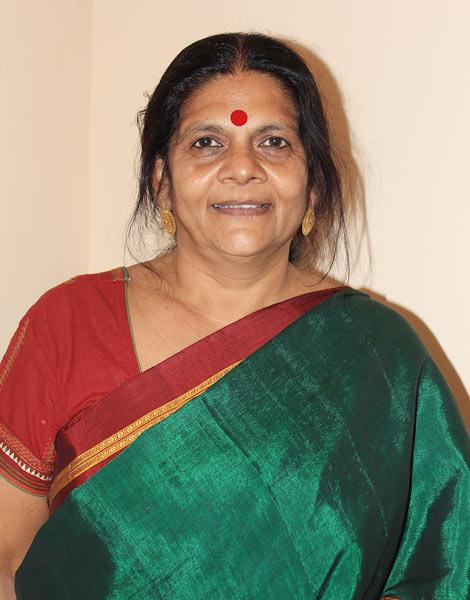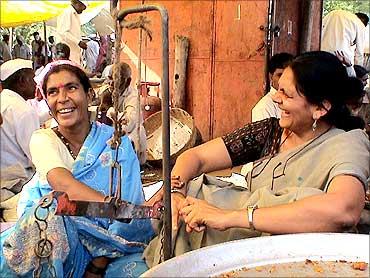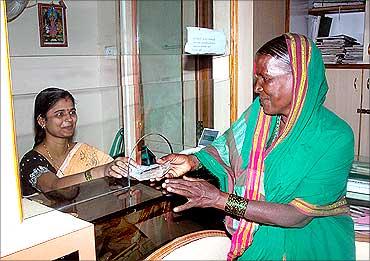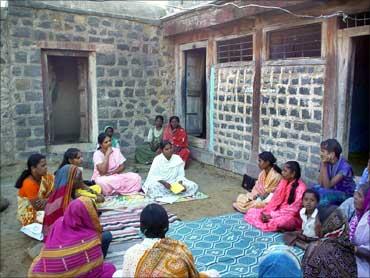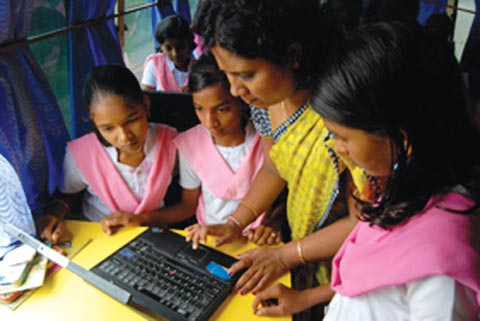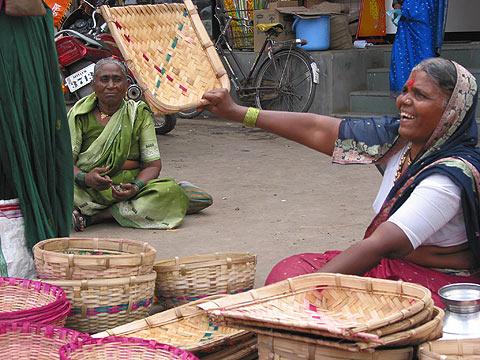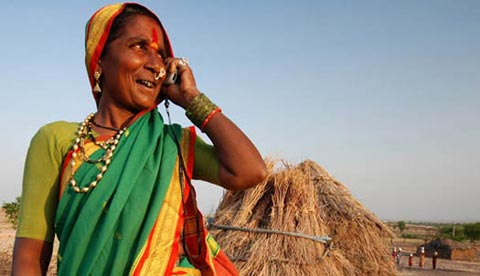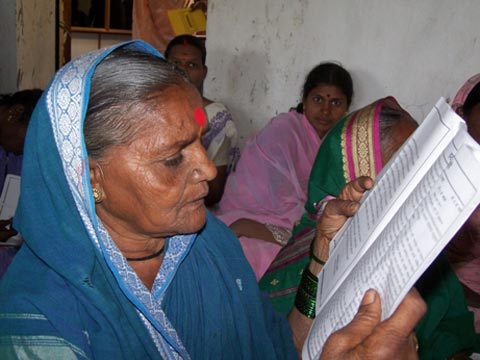 | « Back to article | Print this article |
The inspiring story of women's empowerment in rural India
About 17 years ago, when Chetna Sinha and her husband -- both farmers by profession -- first approached the Reserve Bank of India with the idea of founding a bank to serve the rural women of our country, it was ridiculed upon.
'How can you run a bank with illiterate women who can't even read and write?' asked an officer.
Today, the 53-year-old entrepreneur has been successful in not only starting but also successfully operating three different rural enterprises that are committed to the cause of rural women in the country, which includes India's first co-operative bank for rural women -- the Manndeshi Mahila Bank
In 1997, when Sinha started the bank in Mhaswad, a small village in the Satara district of Maharashtra with a semi-literate workforce of women from the same village, she wanted to provide loans to help farmers recover from their economic condition. But 15 years later, she has managed to do more than just that.
Today, despite facing over 8 to 10 hours of load shedding in a day, the bank has managed to successfully introduce both computerised and door-to-door banking to offer its services to over 1,80,000 women across nine districts in rural Maharashtra and Karnataka, which includes Satara, Solapur, Sangli, Raigarh, Ratnagiri, Pune, Kolhapur, Hubli and Dharwad.
Of these, over 1,55,000 women are savings account holders; most of them earn less than Rs 50 a day.
In 2006, Sinha who holds a Masters degree in Commerce and Economics from the University of Mumbai started the Mann Deshi Business School (MDBS). Since then it has managed to train over 46,000 women in vocational and entrepreneurial skills, of which over 24,000 have gone on to pursue entrepreneurship after receiving professional training.
Further, to look after the needs of several underprivileged women entrepreneurs, in 2012, Sinha partnered with New York-based Clinton Global Initiative (CGI) to set up the Manndeshi Chamber of Commerce for Rural Women (MCCRW), a first of its kind Chamber of Commerce for rural women in India. The MCCRW aims to both mentor and address the grievances of women entrepreneurs in rural India.
In 2002, she was appointed as a World Fellow to Yale University and in 2003, she was recognised as the Bridge Builder by the Harvard University, USA.
We speak to Chetna Sinha, founder, chairperson, Manndeshi Mahila Bank and Manndeshi Udyogini (Business School) who takes us through the challenging journey of setting up the country's first rural bank, as she shares stories of women in her village who inspire her and offers advice to women entrepreneurs on how to be successful in their career.
Please click NEXT to continue reading
'The women in my village were not willing to accept failure'
What inspired you to start a bank in your village?
My husband is a farmer and together we used to grow onions in our farm. In 1993, when the harvests fetched us poor prices, we were very disappointed. We were already struggling to make ends meet after a drought in the '70s. Like us, the women in our village were worried about their future.
When we held a meeting, these women said they wanted to find ways to save the money they earned. Some of them suggested, why not start a bank?
Although they were illiterate women, they had a point. There was not a single bank that was offering any special service for underprivileged women in the village.
What were the challenges you faced while starting the bank?
In 1994, when officers at Reserve Bank of India rejected our idea of running a bank with illiterate women, I felt let down.
But when I came back to my village and told the women that our idea was rejected by the RBI, they were not willing to accept failure.
They said, 'We will learn to read and write'. They said, after their basic training, they will come with me and talk to the officers. I was surprised and agreed.
This time, the women challenged the officers that they organise a test to calculate interest for a given principal amount. "Let's see if your officers can match our speed and accuracy of our women without the electronic calculator."
The officers were impressed by the courage and confidence of women and agreed to induct them for the training process where they learnt the basics of how to run a bank, manage finances, process loans, etc. Most of the employees in my bank are not even graduates, but they know how to run the bank.
How difficult was it to convince the women in your village to invest in the bank?
Since we were from the same village, it helped us communicate better with the women.
We understood their problems and their needs better.
Initially, we offered door-to-door services talking to women about the saving schemes, pension schemes and other investment-related processes.
Since there was no other bank offering this service and because we were targeting the 'non-bankable' section of people, it worked for us eventually. The fact that women could invest as little as Rs 2 to Rs 50 really set the ball rolling for us.
'Women were uncertain about depositing a fixed amount every day/week/month'
What were the mistakes you made and the lessons you learnt along the process?
When I learnt that women wanted to save money but were uncertain about depositing a fixed amount every day/week/month because each one had different needs and expenses to manage. And some of them could not afford to travel to the bank every day or week to deposit their savings.
So, I came up with a unique idea of providing 5000 Mickey Mouse shaped piggy banks to every household in the village.
Women could deposit whatever money they wanted in the piggy bank and our volunteers would collect it from them on a particular date every month. All of us at the bank thought this was a great idea.
When we approached the women, they asked whose idea it was. When I told them it was my idea, they said it was a stupid idea and explained to me why it would not work for them.
They told me that they came from poor families and if they fell short of funds, one of the family members will immediately break open the piggy bank and use it for their needs. There was no way they were going to save money this way. Plus, security of money would be another issue. So, the idea of piggy banks had to be scrapped and replaced with daily door-to-door savings volunteered by our employees.
Since we were running a bank, there were instances when the local politicians indirectly tried to influence the women who worked in our bank. They wanted us to loan them money for their personal use and almost convinced the women to agree to it.
That's when we realised the need to educate our employees about various risks involved in lending money to certain people, and also tell them the right way to do things.
In all these years, a lot of learning about banking and entrepreneurship has come to me from these women. I have learnt that the needs of rural women are different from urban women and hence we need to adapt and cater to them differently.
More than 6000 women now hold a share in the ownership of household property
Can you share the schemes you started with the suggestion of women from the village?
In India, Diwali is an important festival when people buy new clothes, household appliances etc. So, our bank has an annual fixed deposit scheme which matures in October-November.
However, some women came to us saying they wanted us to have a special savings scheme that would mature in June-July. They told me that they wanted to save money to buy books and uniforms for their children when the school reopens. So, we started a new scheme which matured in June-July.
We also realised that women lacked confidence because the men in their family owned everything -- the farm, the land, the house etc. So, we came up with a policy saying that if the men were willing to share the ownership with the woman, and then apply for a loan, we would offer a rebate on the home loan.
Although we come from a patriarchal society, interestingly, men were willing to transfer the property rights to the women in the house to avail of the benefits. Today, we know of 6000 women who have managed to secure a share in the ownership of household property, which is an achievement in itself.
Many of our schemes are customised to empower the underprivileged women living in the villages.
In 2010, we started a community radio service that educates people about agriculture, entrepreneurship and provides important information on policies and decisions that affect their lives. This was to benefit those rural women who work in the fields or stay at home looking after kids and don't have time to attend seminars or go to a business school.
'Ours is not a profit making business school'
What was the purpose behind starting a business school in a village?
Ours is not a profit-making business school.
Mann Deshi business school was started with the aim of helping rural women organise their businesses in a professional manner.
We have customised courses ranging from 1 day to 45 days where women are taught about business planning, investment, promotion, branding and marketing.
We are also the first ones to have a women's chamber of commerce where we address grievances and help them succeed in life.
The programmes are very affordable -- a three-day programme will cost you Rs 15; 30-day programme, Rs 300 and 45-day programme, Rs 600.
We have also tied up with the YCMOU (Yashwantrao Chavan Maharashtra Open University) for some of these certificate programmes.
Do you also offer placements to the women who graduate from the school?
Yes, we try to help women find jobs that are relevant to their interest and training.
Since most of these programmes are industry-linked and have a small intake, the employers are small scale industries who generally induct them after the training programme. We also invite employers to visit our school and interact with village women to help them plan their career.
'Many of them don't know how to market their products effectively'
According to you, what are the problems that women entrepreneurs in your village face?
Since rural women are not well educated, they don't understand finance and hence depend on the male in the house for everything. Even if they earn money, many of them don't know how to control their spending or invest it for higher returns.
Many of them may be selling good products, but they don't know how and where to market it effectively.
Can you share a few case studies that the Chamber of Commerce has addressed recently?
There was this Dalit woman in our village who would sell photo frames and flowers near the temple. But as you know, the attitudes of people in the village towards Dalit people are yet to change. Villagers refused to buy these frames from her because she was Dalit.
When she came to us, we suggested that she should move to the city. After much coaxing, she was willing to try. Initially, she would travel every day to the city to sell her stuff.
She realised that people in the city were more interested in buying her photo frames than worry about her social background. As her business picked up, she decided to move to the city with her family. She was happy.
Similarly, there were women from other backward castes who approached us to help them improve their economic condition and help them start a business.
We suggested that they make use of the government subsidies, but they were adamant. They said they did not want to wait for government subsidies. We helped them with professional training on how to start and run a business. Women want to be independent and with a little self confidence, they can go a long way in achieving what they want.
A 50-yr-old wanted to apply for a loan to buy a mobile phone
Where do you draw your inspiration from?
Every day, I get inspired from the people around me. There are so many women in our village who inspire me in different ways.
When I was young, I grew up watching this woman collect sand from the sea and sell it at a price. This woman would travel by foot and never complain. Today, she runs a small but successful sand mining business in our village and every time I see her, I am inspired by her success.
Then, there was this woman who had 10 donkeys and lived a hand-to-mouth existence. Every year, when the pilgrims travel to Pandharpur visa Mhaswad, she ensures that she will feed about 50 people. One day I saw that after feeding so many people, she would not have enough food for her the next day.
When I asked her, she said, she found joy in feeding the pilgrims who were tired and hungry. Since she was poor, that was her way of giving back to the society.
Very recently, a 50-year-old lady came to our bank and said that she wanted to apply for a loan to buy a mobile phone as she was going to meet her son who lived in the city.
Thinking the lady may want to gift it to her son, our bank employees explained to her that a personal loan would be too expensive for her and that she will not be able to pay it back. But the woman who reared sheep and goat for a living explained to us that she is not gifting the phone to her son and needed it for her own needs while she was away from her village for 8 months.
The old lady had never operated a mobile phone in her life, but the sheer conviction of her request made me realise that when women set out to do something in life, they are not scared of the obstacles or outcomes.
'If you fail, do not let people discourage you'
What is the biggest lesson you have learnt as an entrepreneur?
I have realised that there's always a risk involved with any business. But somehow, there are people in our society who believe that women are not allowed to fail. A man can fail and get away with it, but if a woman fails in something she does, she will be reminded about it for life.
I am forced to remember this incident. When the RBI officer agreed to let us start a bank, he said, 'At least 4 per cent of the bank account holders must be women'. I told him that he was bargaining too low.
There were many who did not believe in our idea and our women. Not only did they accept the challenge, but took failure in their stride and worked hard to improve their and the lives of others who believed in them.
Well, when illiterate women can run a bank, why can't you?
What tips would you like to share with the women entrepreneurs of our country?
I would like to tell them that if you want to create something new and be successful at it, remember that it will take time to happen. You have to be patient. You can't expect overnight success.
You must believe in what you sell. And publicise it well.
If you fail, do not let people discourage you. Take it in your stride and find a new way to deal with the situation.
